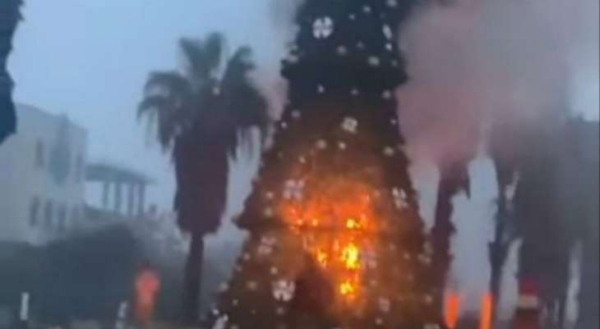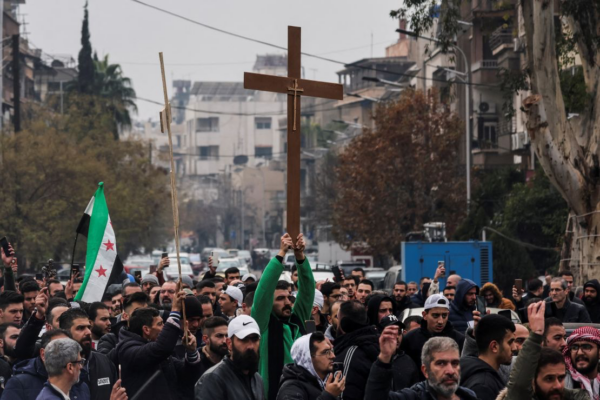Christians marched through Damascus to demand protection for minorities after a Christmas tree was seen burning near Hama.
B: Ya Libnan Editorial Board
The emergence of Ahmed al-Sharaa as the de facto new Syrian leader has raised hopes among many Syrians who yearn for a fresh chapter in their nation’s history. However, the road to rebuilding trust and ensuring stability is fraught with challenges. Among the most pressing is the protection of Syria’s minorities, who have suffered greatly during the country’s prolonged conflict. Recent events, such as the burning of a Christmas tree in a Christian-majority town near Hama, underscore the deep fears and insecurities these communities continue to face.
The incident, captured in video clips that spread rapidly on social media, has sent shockwaves across the country. For Christians celebrating Christmas, the public burning of a symbol of their faith was not only an act of vandalism but a clear assault on their identity and religious freedoms. The group Hayat Tahrir al-Sham (HTS), which controls parts of Syria, quickly attempted to distance itself from the incident, blaming foreign fighters from another faction. HTS even promised to restore the tree and its decorations. But for many, these words ring hollow.

The burning of the Christmas tree is emblematic of a broader issue: the lack of concrete action to protect minorities and ensure their rights in a post-Assad Syria. For years, minorities in Syria, including Christians, Druze, and others, have lived under the shadow of violence and marginalization. While Ahmed al-Sharaa has sought to reassure these communities with promises of fair treatment and inclusion, such incidents highlight the gap between rhetoric and reality.
The fears of Syria’s minorities are not unfounded. The legacy of sectarian strife and the rise of extremist factions have left these communities vulnerable. Many recall how similar promises were made in the past, only to be broken when political expediency or extremist ideologies took precedence. The burning of the tree is not just an isolated act; it’s a chilling reminder of the fragility of religious freedom and the potential for discrimination and violence.

Protests in Damascus following the incident reveal the deep-seated frustration and fear within minority communities. They are calling for more than apologies and symbolic gestures. They demand tangible steps to ensure their safety, protect their places of worship, and guarantee their right to practice their faith without fear. This includes holding perpetrators accountable, whether they are members of HTS or other groups.
Moreover, incidents like these also serve as a litmus test for the new leadership. Al-Sharaa’s response to these events will be scrutinized not only by minorities but by the broader Syrian population and the international community. If the new leadership cannot protect minorities and uphold their rights, it risks perpetuating the cycle of mistrust and division that has plagued Syria for decades.
Syria cannot afford another authoritarian regime that uses minorities as pawns in its political games. Nor can it afford to allow extremist factions to undermine efforts to build a pluralistic society. The new leadership must prioritize creating a robust framework that guarantees equal rights for all Syrians, regardless of their religion or ethnicity. This includes enacting laws to protect minorities, fostering interfaith dialogue, and ensuring that extremist groups are held in check.
For Syria to move forward, actions must replace words. The new leadership’s commitment to inclusivity and justice will only be credible if it translates into real, visible change on the ground. Protecting minorities is not just a moral imperative; it is a cornerstone of building a stable and united Syria. Without this, the hopes for a peaceful and democratic future will remain a distant dream.

